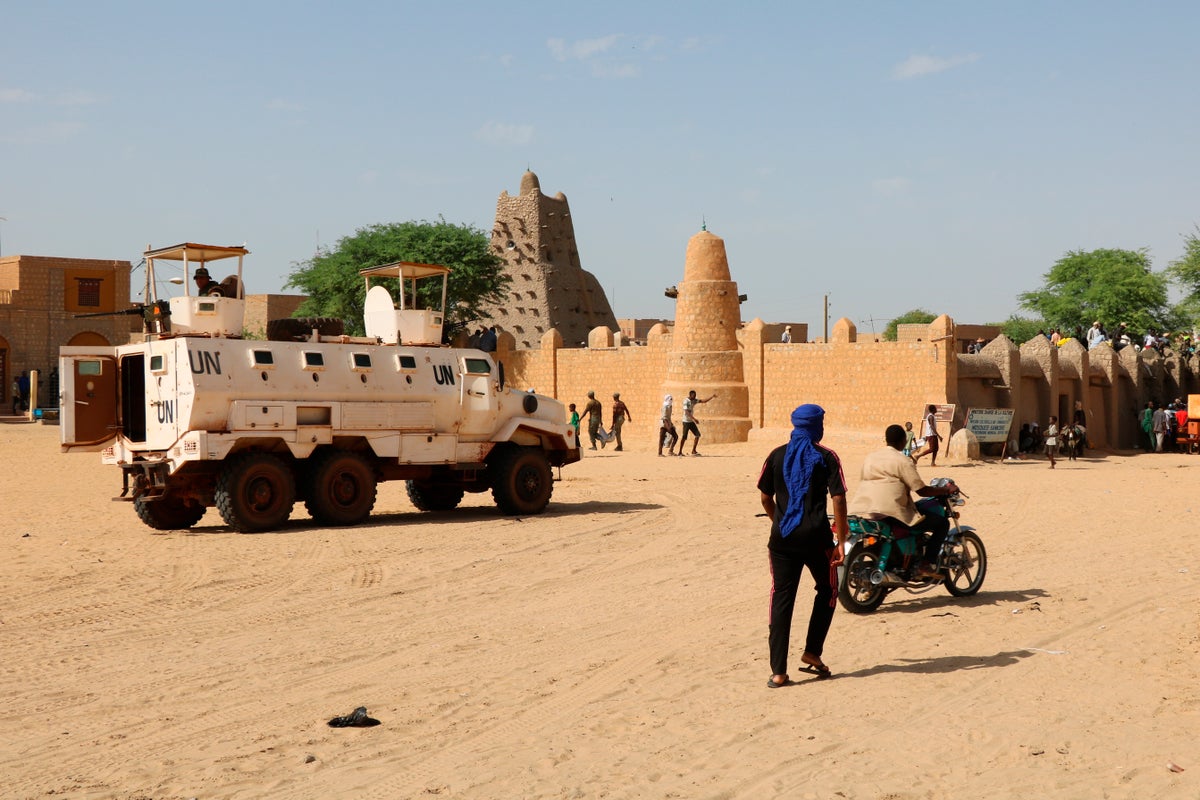
Attacks in northern Mali have more than doubled since U.N. peacekeepers completed the first phase of their withdrawal last month after a decade of fighting Islamic extremists, resulting in more than 150 deaths.
In one brazen attack, militants targeted a triple-decker passenger boat, killing 49 civilians. And this week, another group of rebels attacked Malian army camps in the Lere locality on the border with Mauritania, leaving several security personnel dead and wounded.
Now, fleeing Malians fear the worst is yet to come in the prolonged violence.
“In Timbuktu, all the communities are leaving the city,” said Fatouma Harber, a resident of Timbuktu which is one of the worst-hit areas. “A few weeks ago, a rocket fell in the town, costing the life of a child. Everyone thinks it could fall on them or their children,” Harber added.
After more than three years in power, Mali’s military junta is struggling to fight growing violence in a hard-hit northern region after demanding the withdrawal of around 17,000 peacekeepers. At the same time, a 2015 peace deal with ethnic Tuareg rebels appears to have collapsed, deepening the security crisis.
The ongoing withdrawal of the U.N. force, in Mali since 2013, has created loopholes in the country’s overstretched security architecture, analysts said, the result of which is growing deadly attacks by both the jihadi groups and the former rebels, all eyeing new opportunities to dominate and control more regions.
The frequency of the violent attacks has never been this bad since 2020 when the country recorded the first of two coups that paved the way for the current junta, according to Mahamadou Bassirou Tangara, a Malian security analyst and researcher for the Conflict Research Network West Africa.
“The attacks are growing and the armed groups are carrying out attacks against civilians — that is not new, but (what is new is) the frequency and the intensity,” said Tangara.
Mali has averaged four violent attacks daily since the turn of the year, a 15% increase when compared to the same period last year, according to data from the Armed Conflict Location & Event Data Project (ACLED), a top database for conflicts around the world. But the situation is worse in the country’s hard-hit northern region, such as in Gao town where hostilities have been concentrated. Attacks in that part of Mali have more than doubled since Aug. 25 when the first phase of the U.N. peacekeepers’ withdrawal was completed, resulting in more than 150 deaths.
The Tuareg rebels claimed responsibility for a recent attack on a major Malian army base — a rarity that analysts have said signaled a failure of the crucial peace agreement signed with the rebels who once drove security forces out of northern Mali as they sought to create the state of Azawad there.
Known as the Permanent Strategic Framework for Peace, Security and Development (CSP-PSD), the rebels have also claimed to have temporarily captured parts of Bourem in Gao region where Malian soldiers have been regrouping. The Malian government has referred to them as a “terrorist group” while they in turn have accused the army of violating their security agreement.
Despite being one of Africa’s top gold producers, Mali is ranked the sixth least developed nation in the world. With nearly half of its 22 million people living below the national poverty line, many more face a growing humanitarian crisis as a result of the violence.
More than a third of Mali’s citizens are already in need of humanitarian aid because of the fighting, according to the Mercy Corps aid group, and a growing number of locals in violence hot spots are forced to choose between staying back in their villages to keep their means of livelihoods at the risk of being killed or fleeing to safety.
The U.N. Office for the Coordination of Humanitarian Affairs (OCHA) has already registered more than 33,000 people who have fled the Timbuktu and Taoudeni regions in northern Mali, heading for Mauritania and Algeria to escape the violence.
The al-Qaida-affiliated and Islamic State group-linked organizations in Mali almost doubled the territory they control there in less than a year, according to a recent U.N. report, raising questions from some about the effectiveness of the U.N. peacekeeping force. Referred to as MINUSMA, it eventually became the most dangerous U.N. mission in the world.
After being asked by Mali's military government in June to vacate the country, more than 30% of its personnel are expected to have withdrawn by the end of September, according to MINUSMA spokeswoman Fatoumata Kaba. The operation ends officially on Jan. 1.
Also helping to fight the violence in Mali has been Russia’s Wagner mercenary group, diplomatic and security officials have said.
Mali's military leader, Col. Assimi Goita, recently posed with Russian President Vladimir for a photo that was posted on X, formerly known as Twitter. It was a reminder to many about the existing partnership between Mali and Russia.
Any support from Wagner hasn't been sufficient and can't fill the security gap created by MINUSMA’s withdrawal, said Rida Lyammouri, a senior fellow at the Policy Center for the New South Moroccan think tank. He said that in Mali's hard-hit northern region, security forces are only able to limit their offensive to "few airstrikes (with) no operations on the ground against CSP forces (rebels),” Lyammouri added.
With the U.N. peacekeepers now heading out of Mali, Ryan Cummings, director of Africa-focused security consulting company Signal Risk, said the country's “ability to curtail militant groups” would be limited.
“The withdrawal of MINUSMA is expected to deteriorate an already tenuous security environment in Mali which could potentially have wide-reaching implications for the economic and political environment of the country, particularly in relation to Mali’s intended political transition,” Cummings said.
___
Chinedu Asadu contributed to this report from Abuja, Nigeria.







